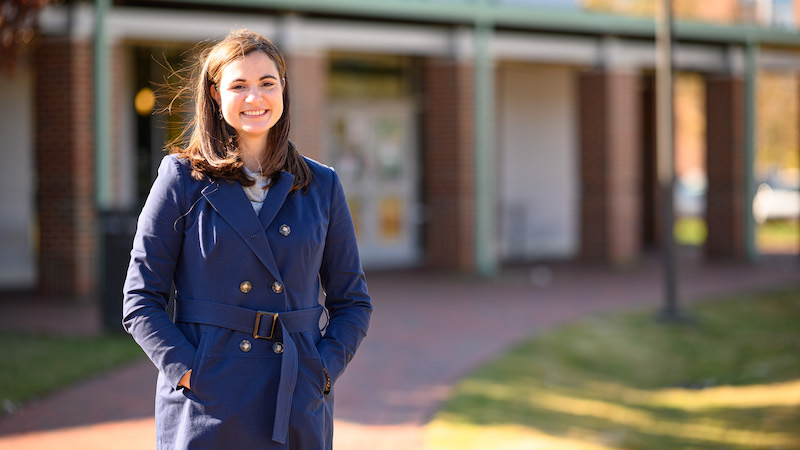DELTA Collaborates with NC State CVM to Create Laboratory Experience Unlike Any Other

Patience is a required virtue for even the most brilliant scientists.
Jonas Salk worked tirelessly for nearly three years to develop the polio vaccine, but began studying viruses decades before. Gregor Mendel outlined the basics of genetics in the mid-1860s, but it would then take scientists almost a century to discover the double-helix structure of DNA.
At the NC State College of Veterinary Medicine, researchers have dedicated their laboratories to singular visions of improving animal and human health — perfecting the use of stem cells to treat heart attacks, unlocking the mysteries of itch, effectively and quickly shrinking cancerous tumors.
In research laboratories, the failures along the way are as important as the final success. A new project led by Melissa Srougi utilizes groundbreaking virtual reality to help train the next generation of scientists.
Srougi, an assistant teaching professor in the CVM’s Department of Molecular Biomedical Sciences, was recently awarded an exploratory grant from NC State’s DELTA to develop a series of virtual reality-based, student-driven training videos on biotechnology laboratory techniques.
Part basic training, part choose your own adventure, the virtual laboratory experience videos will offer students much-needed practice in everything from maintaining cell cultures to manipulating recombinant DNA.

“I think it’s going to be very transformative,” says Srougi. “It’s not just practicing laboratory techniques; it’s practicing the critical analysis. Students are not just doing the steps; they’re understanding what each step means.”
Using virtual reality-equipped smartphones and headsets, students will be transported to an interactive laboratory, where they will practice laboratory skills and become immersed in refining scientific critical-thinking that leads to life-changing discoveries.
The videos will include elements reflecting the in-person lab experience, likely including interactions with other lab members and a virtual teaching assistant, as well as post-experiment troubleshooting.
Srougi hopes to make the videos, now in the early development stage, available to students in the fall.
“Many students, especially in a lab, they’re scared to fail, but that’s often when we learn the most,” says Srougi. “This virtual environment will provide a safe space where students can take risks and see the consequences of the decisions they make.”
Designed before the COVID-19 pandemic, the video training is a supplement to curriculum, not a replacement to in-person learning. It is the second virtual-reality based project at the CVM that DELTA has funded and helped design.
[blockquote color=”red”] I think it’s going to be very transformative. It’s not just practicing laboratory techniques; it’s practicing the critical analysis. [/blockquote]
Andy Stringer, assistant professor of veterinary global and public health at the CVM, launched a selective this year that uses DELTA-funded VR technology to transport students to Ethiopian milk production sites to learn about food security.
DELTA, or Distance Education and Learning Technology Applications, enhances the educational experience at NC State through innovative course design, often integrating advanced technologies into both traditional and distance education courses.
“The thing that is having the most impact is just having the DELTA team on board,” says Srougi. “They’re the ones that make the dreams come to life.”
Srougi, who joined the CVM faculty in 2019, brings a unique personal background to the project. She holds a bachelor’s degree in biology with a minor in chemistry and a Ph.D. in pharmacology, and her research interests include cancer biology and experimental chemotherapeutics, as well as developing strategies to improve student experience in STEM courses.
She sees wide-ranging potential for the VR project. NC State’s Biotechnology Program, which Srougi is a part of, is interdisciplinary, and the virtual training videos reflect molecular biotechnology techniques used by undergraduate, graduate and professional students in more than 80 academic programs across the NC State campus.
Through a grant funded by the National Institutes of Health, the Biotechnology Program is also working to offer more biotechnology-based laboratory opportunities within partner institutions. Srougi says she wants to make the training videos open educational resources, available for free to other universities and institutions.
“When I was in college, we had nothing like this, nor did we have classes that gave us opportunities to practice these laboratory skills. I learned them because I was lucky enough to connect with someone who took me into their lab,” says Srougi. “NC State students are in such a rich academic environment. We want to enhance that experience, not just here at NC State but for any student interested in scientific research.”
~Jordan Bartel/NC State Veterinary Medicine
This post was originally published in Veterinary Medicine News.


